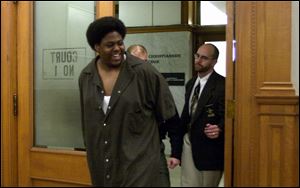
Green, spared death sentence, gets life in execution-style killing
4/7/2001
Joseph Green flashes a smile to family as he enters the courtroom to face the judges who would determine his fate.
The same three-judge panel that gave Joseph Green the death penalty in 1998 sentenced him yesterday to life in prison without parole.
In December the Ohio Supreme Court overturned Green's death sentence for the 1997 “execution-style” killing of Samar El-Okdi because, in part, he wasn't directly asked if he had something to say before judgment was passed in Lucas County Common Pleas Court.
When given that chance yesterday, Green said: “I don't want to say nothing.”
Judges William Skow, Ronald Bowman, and Judith Lanzinger deliberated for about two hours before announcing that because the vote for the death penalty wasn't unanimous, Green would be sentenced to life in prison without the possibility of parole.
Afterward, Judge Skow, who presided over the panel, said the individual votes were confidential.
Judge Skow said one of the factors in the panel's decision was that Douglas Coley, 22 at the time of the murder, likely shot Ms. El-Okdi and that Green was with him. Coley was given the death penalty for the crime after a jury's recommendation.
Also working in Green's favor was the fact that he was 19 at the time of the murder, he has “a limited intellect,” and he was easily led by others, particularly Coley, the panel ruled.
Prosecutors and defense attorneys were not surprised by the ruling. In 1998 the panel wrote that it would have given Green life without parole had it been allowed by law to consider “residual doubt,” specifically whether Green was the principal offender.
But the Ohio Supreme Court said, in its opinion overturning the death penalty, that the panel misinterpreted a ruling that said residual doubt isn't an acceptable mitigating factor. The high court ruled that the judges could have considered that Green wasn't the principal offender.
Yesterday the Lucas County judges ruled that the aggravating circumstances didn't outweigh the mitigating circumstances.
Even though the panel's latest ruling didn't surprise him, John Weglian, chief of the special units division of the Lucas County prosecutor's office, was angered by it.
“They were absolutely right in imposing the death penalty the last time,” Mr. Weglian. “Not a thing changed between then and now.”
Police said Ms. El-Okdi was abducted from in front of her Parkwood Avenue apartment in the Old West End on Jan. 3, 1997. She was shot between the eyes and left to die in an alley near the Toledo Museum of Art.
The men were captured after they were spotted in her car a few days after the murder.
Prosecutors gained their convictions with the help of the testimony of David Moore, another Old West End resident, who was shot five times just 11 days before Ms. El-Okdi was murdered. Like Ms. El-Okdi, he was abducted and later shot by the men for no apparent reason.
Mr. Moore, who attended yesterday's hearing, said he was frustrated by the panel's decision.
“The real disappointment is that it was reduced to a lower penalty, whether [Green] actually died or not,” said Mr. Moore, who still has shoulder pain and numbness in his left hand because of the shooting.
Ronnie Wingate, one of Green's attorneys, said he understood Mr. Moore's feelings, but one side or the other was going to leave the courtroom disappointed.
“If he would have been given death, [Green's] family would have been displeased. And when he was given life, the victim's family was unhappy,” Mr. Wingate said.
Sam El-Okdi, Ms. El-Okdi's father, declined to comment after the ruling.